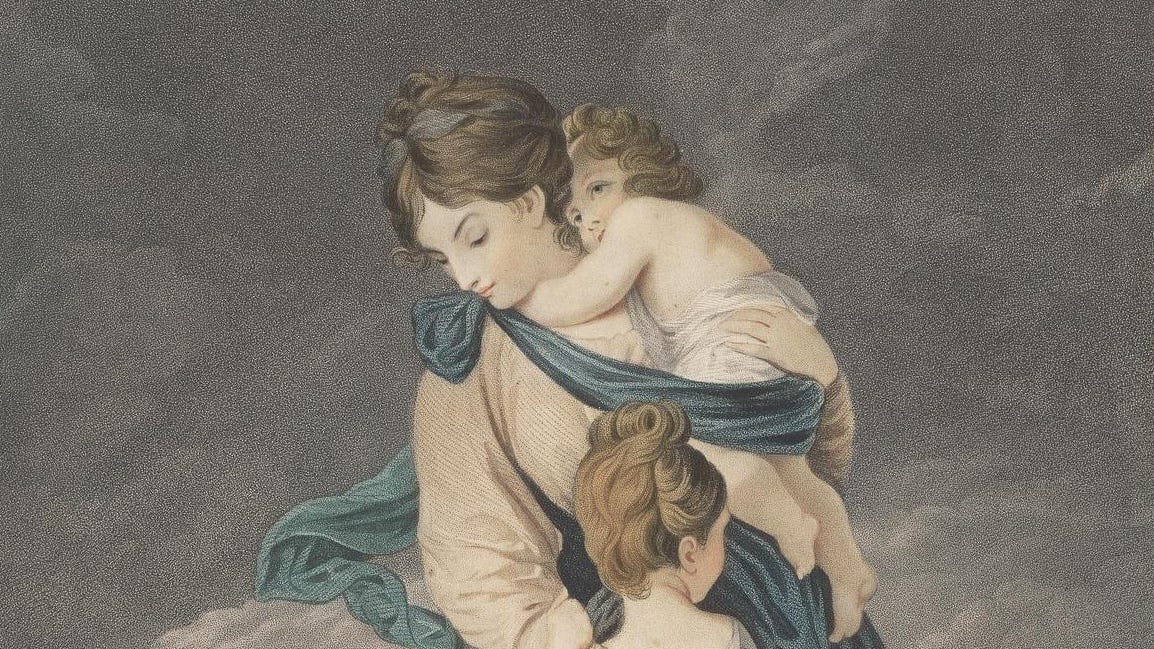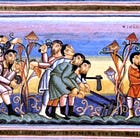Why are good works worthless without charity?
Animosity and jealousy can render good works worthy of punishment, rather than reward.

Animosity and jealousy can render good works worthy of punishment, rather than reward.
Editor’s Notes
Our Lord told the Parable of the Labourers in the Vineyard, read on Septuagesima Sunday, near the end of his ministry—shortly before his entry into Jerusalem.
It follows Christ’s promise of a hundredfold reward for those who leave all to follow Him, and comes immediately before the request of James and John for places of honour in the Kingdom.
In this piece, Fr. Coleridge tells us:
That St Paul’s vocation, though extraordinary, would have been in vain without charity
Why the highest spiritual gifts and labours are worthless without the love of God and neighbour
How St Paul warns the Corinthians that divisions and jealousy can render great works fruitless—and how this applies to us today.
He shows us that the true measure of sanctity is not gifts or labours, but charity.
It has been argued elsewhere that Septuagesima Sunday represents a “new beginning” of the Liturgical Year, or at least within it. It is fitting that this new beginning focuses on the greatest of the theological virtues.
Part I: Is it unfair that 'the first will be last' in the Parable of the Labourers in the Vineyard?
Part II: Does your rank in the Church determine holiness and reward?
Part III: Why are good works worthless without charity?
Part IV: Why do so many who are called fall away?
The Labourers in the Vineyard
The Preaching of the Cross, Vol. III
Ch. XI, pp 195-200.
St. Matt. xix. 30, xx. 1–16; St. Mark x. 31
Story of the Gospels, § 127.
Burns and Oates, London, 1888
Headings and some line breaks added.
Sung on Septuagesima Sunday
Recap: In discussing the idea that “the first will be last, and the last will be first,” Our Lord may have even been thinking of St Paul, who was to go from being the persecutor of the Church to the Apostle to the Gentiles—making this parable a lesson for the Apostles on how to treat the converted Paul in due course.
St Paul’s doctrine to the Corinthians
St. Paul himself can teach us how true it is that even the highest vocations in the Church are not safe, if there is a lack of charity.
Let us listen to him for a while, as he speaks to the Corinthian Church.
‘God indeed hath set some in the Church, first Apostles, secondly prophets, thirdly doctors, after that, miracles, then the graces of healings, helps, governments, kinds of tongues, interpretations of speeches.’
He enumerates the orders of men who are conspicuous in the visible Church for their spiritual gifts. He goes on,
‘Are all Apostles? are all prophets? are all doctors? are all workers of miracles? Have all the grace of healing? Do all speak with tongues? Do all interpret?’
He means that these gifts are distributed according to the free choice of God, and he adds that it is well to desire to have higher and higher gifts for His service.
‘And yet,’ he subjoins, ‘I show you yet a more excellent way. If I speak with the tongues of men and of angels, and have not charity, I am become as sounding brass or a tinkling cymbal. And if I should have all prophecy, and should know all mysteries, and all knowledge, and should have all faith, so that I could remove mountains, and have not charity, I am nothing.’
Here is a distinct reference to the Gospel history, which reports our Lord’s words about faith moving mountains.
He proceeds to speak of some of those services to God which belong to the class of which our Lord speaks in the passage before the parable, and of which passage it is an explanation.
‘And if I should distribute all my goods to feed the poor,’ as was proposed to the rich young man by our Lord, ‘and if I should deliver my body to be burned, and have not charity, it profiteth me nothing.’
Then follows here the well-known passage in which charity is described, of which we shall have to speak presently. All those sacrifices which can be made to God in various vocations are temporary, they belong to this life, and end with this life, as also the preternatural gifts, the gratiae gratis datae, which will vanish before that which is perfect in Heaven.
But charity is the same in the next world as in this:
‘Charity never falleth away, whether prophecies shall be made void, or tongues shall cease, or knowledge shall be destroyed. For we know’ here below ‘in part, and we prophesy in part’ according to the needs of the Church in our day.
‘But when that which is perfect is come, then that which is in part shall be done away. When I was a child, I spoke as a child, I understood as a child, when I became a man I put away the things of a child. We see now through a glass darkly, but then face to face. Now I know in part, but then I shall know, even as I am known.’ (1 Cor. xii. 28–31; xiii. 1–12.)
Contentions among them
This would not be the place for a full exposition of this passage, and the context from which it is taken. A few considerations will be enough to explain how it illustrates the parable before us.
First, it is clear that St. Paul intends most gently to warn the Corinthians against a fault which is not very unlike that ‘evil eye’ of which our Lord here speaks.
The Corinthian Church was one in which there were a great many jealousies and rivalries. The very richness of the spiritual gifts, of the order of gratiae gratis datae, which were imparted to some among the community, was a cause of ambition and invidious comparison. The Epistle begins in a way that touches the evil in a most delicate way, which has something almost of irony about it.
St. Paul gives thanks for the grace given them, ‘that in all things you are made rich in all utterance and in all knowledge,’ and the like, and then immediately passes to the necessity of mutual union and charity.
‘Now I beseech you, brethren, by the name of our Lord Jesus Christ that you all speak the same thing, and that there be no schisms among you… For it hath been signified unto me, my brethren, of you… that there are contentions among you.’
It is as if he had said, ‘I am indeed glad to hear of your abounding in the gifts of spiritual intelligence. That is all very well—but how is it that there are contentions among you?’
We need not dwell on the dexterous manner in which St. Paul deals with this subject-matter, speaking as if the contentions had been between the partisans of himself and Apollo.
‘But these things, brethren, I have in a figure transferred to myself and Apollo, for your sakes.’
The Epistle then proceeds with various subjects, which had been matters of inquiry addressed to St. Paul, or on which he animadverts. At length, in the twelfth chapter, he comes to the question of ‘spiritual gifts,’ and speaks of their variety and order.
What it is important for us to observe is, that all through there runs the strain of warning against the danger of uncharity among the possessors of these gifts. It is here that he draws out his great comparison of the Church to the human body. This is entirely St. Paul’s, although it may have been suggested by the language of our Lord about the Vine and its branches.
The point to be noticed is that, in his treatment of the subject before him, St. Paul seems to insist on the matter of charity far more than he need, unless he had seen some great danger among the Corinthians from the absence of this virtue.
And, if the danger had been peculiar to that Church or that day, and not of universal importance, we perhaps should not have had it in an Epistle preserved to us as a part of the Sacred Scriptures.
Gifts useless without charity
It is to be noted also that St. Paul does not so much insist on the supremacy of charity among the virtues, as upon the utter worthlessness of all others without it.
If he speak with tongues of men and angels, and has not charity, he is not only poorly furnished, he is as sounding brass and a tinkling cymbal. Prophecy, the knowledge of mysteries, the faith that can move mountains—with all these, if he has not charity, he is nothing.
It profits him absolutely nothing, without charity, to have given his goods to feed the poor, and his body to be burned. And when he comes to describe charity, we can see what he is afraid of among those to whom he writes by the qualities which he names as contrary to this virtue.
It is patient and kind, he says, but he soon passes to what it is not. It is not envious, it dealeth not perversely, it is not puffed up, it is not ambitious, it seeketh not its own, it is not provoked to anger, it thinketh no evil, it does not rejoice in evil, but rejoiceth with the truth, beareth all things, believeth all things, hopeth all things, endureth all things.
This description of the virtue, chiefly from the negative side, taken together with the manner in which St. Paul pours himself out on the subject, as it seems, superabundantly, before he returns to the direct subject of spiritual gifts—‘follow after charity, be zealous for spiritual gifts, but rather that ye may prophesy’—shows us that in the mind of the Apostle the thought was prominent of the uselessness of all high vocations without charity, and the way in which the highest services or vocations may be spoilt by the want of charity.
But this is just the point in the parable before us on which we are dwelling. And it is too true, as a matter of experience, that men may serve God very well in a number of manners, and yet, after all, be shipwrecked as to their very salvation from the want of charity.
The world is full of temptation against it, which sometimes overcomes even those who suffer much and labour much for the faith, as in the story of the Christian priest who was being led to martyrdom, and met some one from whom he thought he had received an injury which he refused to forgive.
In the next part, Fr. Coleridge will tell us:
Why the equal reward in the parable of the labourers does not mean all receive the same in Heaven.
How the single denarius shows that the true measure of reward is not status but charity.
How those who murmur against God’s generosity risk losing their place through a lack of charity.
He will show us that the first become last not by injustice, but by their own uncharitable spirit.
Hit SUBSCRIBE now to make sure you don’t miss anything from The Father Coleridge Reader
The Labourers in the Vineyard
Part I: Is it unfair that 'the first will be last' in the Parable of the Labourers in the Vineyard?
Part II: Does your rank in the Church determine holiness and reward?
Part III: Why are good works worthless without charity?
Part IV: Why do so many who are called fall away?
Here’s why you should subscribe to The Father Coleridge Reader, and share it with others:
Fr Coleridge provides solid explanations of the entirety of the Gospel
His work is full of doctrine and piety, and is highly credible
He gives a clear trajectory of the life of Christ, its drama and all its stages—increasing our appreciation and admiration for the God-Man.
If more Catholics knew about works like Coleridge’s, other works based on sentimentality and dubious private revelations would be much less attractive.
But sourcing and curating the texts, cleaning up scans, and editing them for online reading is a labour of love, and takes a lot of time.
Will you lend us a hand and hit subscribe?
Read next:
Follow our projects on Twitter, YouTube and Telegram:






